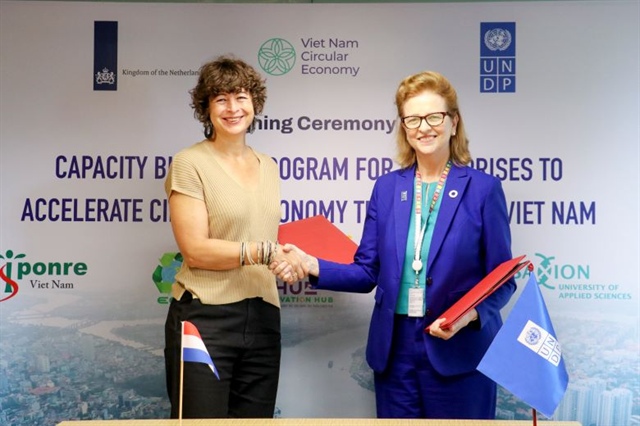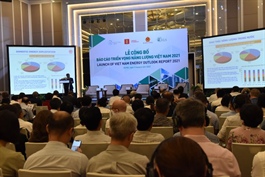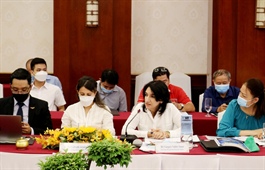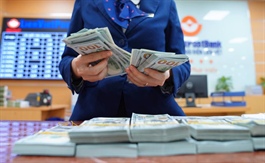SMEs advance circular economy in Vietnam
SMEs advance circular economy in Vietnam
SMEs are important in increasing the adoption, implementation, and operation of circular business models and low-carbon technologies.
Small- and medium-sized enterprises (SMEs), which account for 96% of the total number of businesses in Vietnam, are believed to be the main force in accelerating the circular economy transition in the country.
Given their role in the economy, the Netherlands Embassy in Vietnam and the United Nations Development Programme (UNDP) will execute a circular economy capacity building program for businesses, which is aimed to deliver knowledge on the circular economy, government policies on circular economy development, and the European-Vietnam Free Trade Agreement (EVFTA) requirements for sustainable trade.

Elsbeth Akkerman, Ambassador of the Kingdom of the Netherlands to Vietnam (L), and UNDP Resident Representative in Vietnam Caitlin Wiesen at the launching ceremony held in Hanoi on June 2. Photo: UNDP |
Financed by the Netherlands, UNDP, and other partners, the program’s overall aim is to inspire and take guidelines for the transition towards circular economy principles and implementation.
According to UNDP Resident Representative in Vietnam Caitlin Wiesen, SMEs, which employ 47% of the labor force and contribute 36% to the gross domestic product (GDP), play a crucial role in increasing the adoption, implementation, and operation of circular business models, low-carbon technologies, and clean technologies.
“The circular economy transition within an enterprise requires both changing in awareness and behavior of shifting production and business activities towards green and sustainable, beside the environmental and economic benefits,” she said at the launch of the program in Hanoi on June 2.
Elsbeth Akkerman, Ambassador of the Kingdom of the Netherlands to Vietnam, said through the capacity building program, Vietnamese enterprises are expected to be equipped with practical knowledge and expertise to develop their circular business models. “The transition towards a circular economy is the only way to make our economies, societies, and planet greener and healthier,” she emphasized.
The program, which is the second of its kind, will be jointly executed from June 2022 by the Institute of Strategy and Policy on Natural Resources and Environment (ISPONRE), Environmental Economic Policy Institute (EEPI), Hue Innovation Hub (Hi Hub), the Institute for Circular Economy Development (ICED) and the Saxion University of Applied Sciences, Netherlands.
In 2021, UNDP – together with the embassies of Norway, the Netherlands, and Finland – assisted the Ministry of Natural Resources and Environment (MoNRE) in developing the “Vietnam Circular Economy Hub” (CE Hub).
The CE Hub is designed to raise awareness and build capacity for all stakeholders namely public authorities, businesses, civil society, and academia to adopt circular economy principles, create synergies, and integrate financial and technical resources.
Under the CE Hub, a Circular Economy Stewardship Group was established. UNDP, ISPONRE, Hanoi Foreign Trade University (FTU), and Danang Business Incubator (DNES) successfully organized the 1st Circular Economy Training Program for business, where they have training courses for 52 businesses and 47 trainees who are lecturers, experts, and managers.
In the Revised Law on Environmental Protection adopted by Vietnam’s National Assembly in 2020, the circular economy plays an important role, defined as an economic model in which production and consumption are aimed to reduce the exploitation of natural resources, limit waste discharge, and extend product lifecycle.
Sticking to the model, MoNRE has worked on the issue with authorized agencies and partners to minimize environmental impacts for Vietnam’s sustainable development.



























